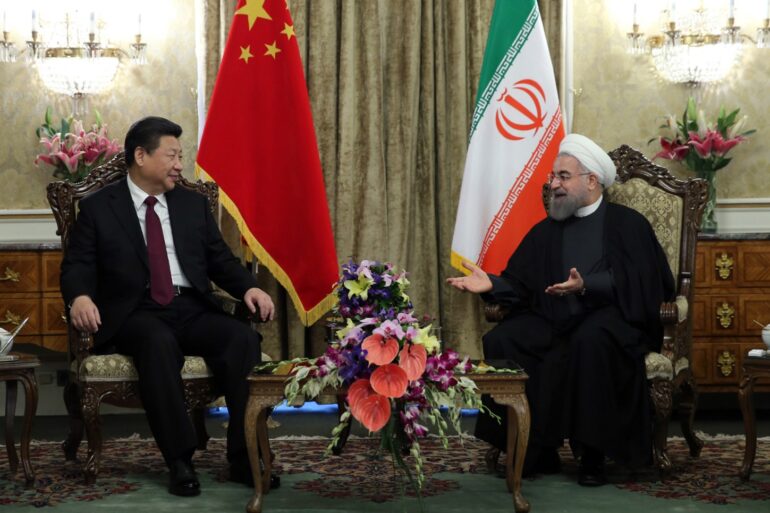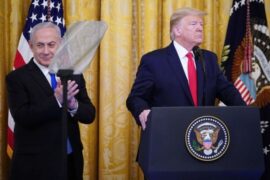The recent Beijing-brokered Iran-Saudi detente has caused much panic, mainly imported into Israel by US officials from across the Atlantic: a bipartisan push to utilize the panic to increase Israel’s dependency on Washington coupled with a partisan Republican agenda to sway global opinion against the Biden administration.
These voices allege that the globally ascendant China has capitalized on a moment of American global weakness by forcing Saudi Arabia – a longtime ally of the United States – to the feet of Iran, sidelining Israel’s cold alliance with the Saudis and emboldening Iran in its quest to wipe Israel off of the map.
While it is true that this development is a consequence of waning American global strength, it is not Saudi Arabia that has surrendered to Iran. The Saudis have realized that the empire, through the Bush, Obama, Trump, and now Biden administrations, has had minimal ability to curb Iranian state-sponsored violence and stop their path to nuclear weapons development. Furthermore, the United States has refused to recognize its inability to deal with Iran and has consistently taken positions against any escalation against Iran to compensate for these failures.
Saudi Arabia has reasoned that Beijing is more capable than Washington of containing Tehran. The 25-Year Cooperation Program signed between China and Iran in 2021 essentially placed the ailing Iranian economy in Chinese hands as a part of China’s Belt and Road Initiative, granting Beijing significant influence over Iranian policy.
Geopolitical analyst Brandon J. Weichert argues that China is using Iran as a wedge to peel Saudi Arabia and Israel from the American orbit into their own sphere of influence, similar to how China is using Russia to sway European countries. Weichert identifies Saudi Arabia and Israel as top targets for Chinese diplomatic inroads due to their technological prowess, Saudi Vision 2030 and Silicon Wadi.
Bringing Saudi Arabia and Israel into the Chinese sphere of influence would greatly benefit the People’s Republic of China as it looks to rapid technological innovations in “biotechnology, quantum computing, artificial intelligence, metamaterials, hypersonic technologies, fifth-generation and sixth-generation communications,” etc., driven by the two Semitic nations, which Beijing sees as the key to propelling itself past the United States as a global power.
As evidence for this analysis, Weichert points to two developments that coincided with the Saudi-Iran detente. First was the announcement that the Chinese state communications giant Huawei was moving its Middle East regional headquarters to Riyadh, an expression of how closely tied China’s technological interests are with its diplomatic inroads into Saudi Arabia. Second was the barrage of rockets launched by Iranian proxies in Lebanon, Syria, Gaza, and Sinai at Israel. Weichert explains:
“It is not that China wants to destroy Israel. It’s that China wants to pressure Israel’s leaders through China’s Iranian proxies into abandoning Israel’s relationship with the United States.”
Through the Belt and Road Initiative, China has to a degree domesticated Iran and its proxies as its lapdog in the Semitic region. China set this lapdog on Saudi Arabia, calling it to heel in exchange for Saudi Arabia’s willing entrance into the Chinese sphere of influence and the opening of its tech sector to Chinese cooperation. Now China seeks to do the same for Israel: using Iran and its proxies as a demonstration of US global impotence, presenting itself instead as the only power capable of controlling Iran, and seeking to open avenues of technology and economic cooperation in exchange for the peace and security it can exclusively provide.
Contrary to what the American doomsayers would have us believe, these diplomatic moves are an advancement toward Saudi-Israeli normalization. Writing for the Foundation for the Defense of Democracies, Hussain Abdul-Hussain notes that Saudi Arabia has continued to make moves toward peace with Israel, such as the promotion of an outspoken proponent of the Abraham Accords, Salman bin Yousuf Aldossary, to Minister of Media on March 5, 2023, just days before the deal with Iran was announced.
Hussain describes the foreign policy pursued by Crown Prince Muhammad Bin Salman and Aldossary as “Saudi First”: reevaluating ongoing loyalties in terms of the return for Saudi Arabia. Countries and causes considered “ungrateful” or a “lost cause” have seen their funding and support from Saudi Arabia slashed, seen with Saudi Arabia pulling funding and support from Lebanon in 2018. Hussain views the Western-backed Palestinian Authority, beneficiaries of roughly $7 billion in Saudi money since the year 2000, as next on Salman’s chopping block if they don’t start showing Riyadh a return on investment.
Salman has long spoken of the State of Israel as a “potential ally” – a partnership that could garner more gratitude and benefit towards Saudi Arabia than their sour relationship with the PA ever did. Creating a China-backed non-aggression agreement with Iran paves the way for Saudi Arabia to normalize relations with Israel without sparking a war with Iran. Speaking with Army Radio on the Saudi-Iran detente, Israeli Foreign Minister Eli Cohen (Likud) seemed to corroborate this theory: “It is precisely this thing that can lead to a balancing act of [Saudi Arabia] moving towards Israel.”
Even with the more recent announcement that the Saudi Kingdom will be flying out Hamas and PA officials for state visits, the first of their kind in years, Hussain remains ardent in his understanding of the Saudi position, tweeting:
“Unlike what many think, Saudi reconciliation makes it easier for Riyadh to sue for peace with Israel, whenever the Saudis decide. If Saudi does go for peace, none of these — Islamist Iran, Assad, Hamas — will say a word. They will love Saudi, despite peace with Israel, just like they love Turkey, whose ties with Israel have been steadily growing. Iran, Assad, Hamas are a bunch of charlatans.”
Cooled tensions with Iran and its surrogates, taking war off of the table, increases flexibility in Saudi decision-making, following the precedents of other Muslim states which have simultaneously warmed to both the Iranian axis and Israel.
The prospect of becoming the facilitator of Saudi-Israeli peace is nothing short of tantalizing for Beijing. Not only would China be introducing Israel into its sphere of influence, opening the door for Sino-Israeli economic and tech cooperation, but it serves as a clear usurping of the Abraham Accords as a Chinese, rather than American, initiative.
Comondering the Abraham Accords from the seemingly asleep-at-the-wheel Biden administration would establish China as the sole outside broker present in the Semitic region, dramatically shifting the global balance of power.
Israel’s decades-long fealty to the United States, contrary to the talking points of politicians and lobbyists, has had more cost than benefit for the Jewish state. Israel has subjected its military to US micromanagement and has been forced into emasculating and destructive retreats from Sinai, much of the West Bank, Lebanon, and the Gaza Strip, while the US regularly interferes in domestic Israeli political issues and is not even able or interested in helping Jerusalem deal with its foremost geopolitical rival.
Time will tell if the Saudis are correct in their assessment that Beijing is more able to control Iran than Washington, but that bar is already incredibly low. Israel should strongly consider a turn to the ascendant and superiorly capable global power in the east, take the almost guaranteed chance that Beijing can control Iran more effectively than Washington, establish normalized relations with Saudi Arabia under Chinese brokerage, and open a mutually beneficial avenue for technological and economic cooperation with China.
Israel has already begun to reach out to China in this way. In a call with his Chinese counterpart this week, Foreign Minister Cohen pivoted to the Iranian threat: “The danger we see in the Iranian nuclear program [is] a danger that is shared by many countries in the region, including countries that have diplomatic relations with Iran. The international community must act immediately to prevent the regime in Iran from obtaining nuclear capabilities.”
Cohen is positioning Israel as part of a block of Semitic countries, including Saudi Arabia and the United Arab Emirates, that feel threatened by an ascendant Iran and are turning towards China, rather than the US, as a capable security partner against Iran. At the same time, Likud officials and activists have been criticizing Washington more frequently and assertively.





